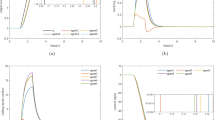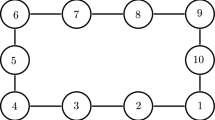Abstract
This paper investigates the sampled-data consensus problem of general linear multi-agent systems via new event-based control. Both the leaderless and leader-following consensus problems are considered. Different from the existing results, the state information is assumed to be unknown for each following agent and only the relative output information between neighbouring agents can be measured. A new Kx-functional observer-based output feedback event-based protocol is designed, which may have lower dimension than the full-order and reduced-order observer. The improved event-based condition bounds each agent’s measurement error by a time-dependent threshold. Furthermore, the Zeno behavior is excluded by showing that the inter-event time between any two triggering events is lower bounded by a strictly positive value. Finally, a numerical simulation example is presented to demonstrate the effectiveness of the proposed control protocols.
Similar content being viewed by others
References
K. Shi, Y. Y. Tang, X. Liu, and S. Zhong, “Non-fragile sampled-data robust synchronization of uncertain delayed chaotic lurie systems with randomly occurring controller gain fluctuation,” ISA Transactions, vol. 66, no. 66, pp. 185–199, 2017.
K. Shi, Y. Tang, S. Zhong, C. Yin, X. Huang, and W. Wang, “Nonfragile asynchronous control for uncertain chaotic lurie network systems with bernoulli stochastic process,” International Journal of Robust & Nonlinear Control, vol. 28, no. 5, pp. 1693–1714, 2018.
J. Wang, K. Shi, Q. Huang, S. Zhong, and D. Zhang, “Stochastic switched sampled-data control for synchronization of delayed chaotic neural networks with packet dropout,” Applied Mathematics and Computation, vol. 335, pp. 211–230, 2018.
T. H. Lee and H. P. Ju, “Improved criteria for sampled-data synchronization of chaotic lur’e systems using two new approaches,” Nonlinear Analysis Hybrid Systems, vol. 24, pp. 132–145, 2017.
T. H. Lee, Z. G. Wu, and H. P. Ju, “Synchronization of a complex dynamical network with coupling time-varying delays via sampled-data control,” Applied Mathematics & Computation, vol. 219, no. 3, pp. 1354–1366, 2012.
H. Shen, F. Li, S. Xu, and V. Sreeram, “Slow state variables feedback stabilization for semi-markov jump systems with singular perturbations,” IEEE Trans. on Automatic Control, vol. 63, no. 8, pp. 2709–2714, 2018.
H. Shen, Y. Zhu, L. Zhang, and J. H. Park, “Extended dis-sipative state estimation for Markov jump neural networks with unreliable links,” IEEE Trans. on Neural Networks, vol. 28, no. 2, pp. 346–358, 2017.
H. Shen, S. Huo, J. Cao, and T. Huang, “Generalized state estimation for markovian coupled networks under round-robin protocol and redundant channels,” IEEE Trans. on Systems, Man, and Cybernetics, vol. 49, no. 4, pp. 1292–1301, 2018.
R. OlfatiSaber and R. Murray, “Consensus problems in networks of agents with switching topology and time-delays,” IEEE Trans. on Automatic Control, vol. 49, no. 9, pp. 1520–1533, 2004.
Y. Hong, J. Hu, and L. Gao, “Tracking control for multi-agent consensus with an active leader and variable topology,” Automatica, vol. 42, no. 7, pp. 1177–1182, 2006.
W. Ni and D. Cheng, “Leader-following consensus of multi-agent systems under fixed and switching topologies,” Systems & Control Letters, vol. 59, no. 3–4, pp. 209–217, 2010.
D. V. Dimarogonas, E. Frazzoli, and K. H. Johansson, “Distributed event-triggered control for multi-agent systems,” IEEE Trans. on Automatic Control, vol. 57, no. 5, pp. 1291–1297, 2012.
W. Hu, L. Liu, and G. Feng, “Consensus of linear multi-agent systems by distributed event-triggered strategy,” IEEE Trans. on Cybernetics, vol. 46, no. 1, pp. 148–157, 2016.
T. H. Cheng, Z. Kan, J. R. Klotz, J. M. Shea, and W. E. Dixon, “Event-triggered control of multi-agent systems for fixed and time-varying network topologies,” IEEE Trans. on Automatic Control, vol. 62, no. 10, pp. 5365–5371, 2017.
J. Y. Liu, W. S. Chen, and H. Dai, “Sampled-data based distributed convex optimization with event-triggered communication,” International Journal of Control, Automation, and Systems, vol. 14, no. 6, pp. 1–9, 2016.
G. Guo, L. Ding, and Q. L. Han, “A distributed event-triggered transmission strategy for sampled-data consensus of multi-agent systems,” Automatica, vol. 50, no. 5, pp. 1489–1496, 2014.
J. Hu, G. Chen, and H. X. Li, “Distributed event-triggered tracking control of leader-follower multi-agent systems with communication delays,” Kybernetika, vol. 4, no. 4, pp. 630–643, 2011.
Y. Fan, L. Liu, G. Feng, and Y. Wang, “Self-triggered consensus for multi-agent systems with zeno-free triggers,” IEEE Trans. on Automatic Control, vol. 60, no. 10, pp. 2779–2784, 2015.
G. S. Seyboth, D. V. Dimarogonas, and K. H. Johansson, “Event-based broadcasting for multi-agent average consensus,” Automatica, vol. 49, no. 1, pp. 245–252, 2013.
W. Zhu, Z. P. Jiang, and G. Feng, “Event-based consensus of multi-agent systems with general linear models,” Auto-matica, vol. 50, no. 2, pp. 552–558, 2014.
D. Yang, W. Ren, X. Liu, and W. Chen, “Decentralized event-triggered consensus for linear multi-agent systems under general directed graphs,” Automatica, vol. 69, no. 69, pp. 242–249, 2016.
B. Cheng and Z. Li, “Fully distributed event-triggered protocols for linear multi-agent networks,” IEEE Trans. on Automatic Control, 2018. DOI: 10.1109/TAC.2018.2857723
X. Wang and M. D. Lemmon, “Event-triggering in distributed networked control systems,” IEEE Trans. on Automatic Control, vol. 56, no. 3, pp. 586–601, 2011.
C. Nowzari and J. Cortés, “Distributed event-triggered coordination for average consensus on weight-balanced digraphs,” Automatica, vol. 68, no. 68, pp. 237–244, 2016.
E. Garcia, Y. Cao, and D. W. Casbeer, “Decentralized event-triggered consensus with general linear dynamics,” Automatica, vol. 50, no. 10, pp. 2633–2640, 2014.
Z. Tang, “Event-triggered consensus of linear discrete-time multi-agent systems with time-varying topology,” International Journal of Control, Automation, and Systems, vol. 16, no. 3, pp. 1179–1185, 2018.
Z. Tang and C. Li, “Distributed event-triggered containment control for discrete-time multi-agent systems,” International Journal of Control, Automation, and Systems, vol. 16, no. 6, pp. 2727–2732, 2018.
J. Hu and W. X. Zheng, “Adaptive tracking control of leader-follower systems with unknown dynamics and partial measurements,” Automatica, vol. 50, no. 5, pp. 1416–1423, 2014.
Z. Li, Z. Duan, G. Chen, and L. Huang, “Consensus of mul-tiagent systems and synchronization of complex networks: a unified viewpoint,” IEEE Trans. on Circuits & Systems I Regular Papers, vol. 57, no. 1, pp. 213–224, 2010.
X. Xu, S. Chen, and L. Gao, “Observer-based consensus tracking for second-order leader-following nonlinear multi-agent systems with adaptive coupling parameter design,” Neurocomputing, vol. 156, pp. 297–305, 2015.
Y. Wu and J. Hu, “Observer-based output regulation of cooperative-competitive high-order multi-agent systems,” Journal of The Franklin Institute, vol. 355, no. 10, pp. 4111–4130, 2018.
Y. Wu, J. Hu, Y. Zhang, and Y. Zeng, “Interventional consensus for high-order multi-agent systems with unknown disturbances on coopetition networks,” Neurocomputing, vol. 194, no. 194, pp. 126–134, 2016.
J. Hu, Y. Wu, T. Li and B. K. Ghosh, “Consensus control of general linear multi-agent systems with antagonistic interactions and communication noises,” IEEE Trans. on Automatic Control, 2018. DOI: 10.1109/TAC.2018.2872197
Z. Li, X. Liu, P. Lin, and W. Ren, “Consensus of linear multi-agent systems with reduced-order observer-based protocols,” Systems & Control Letters, vol. 60, no. 7, pp. 510–516, 2011.
B. Zhou, C. Xu, and G. Duan, “Distributed and truncated reduced-order observer based output feedback consensus of multi-agent systems,” IEEE Trans. on Automatic Control, vol. 59, no. 8, pp. 2264–2270, 2014.
Y. Hu, J. Lam, and J. Liang, “Consensus of multi-agent systems with luenberger observers,” Journal of the Franklin Institute, vol. 350, no. 9, pp. 2769–2790, 2013.
J. Zhang and G. Feng, “Event-driven observer-based output feedback control for linear systems,” Automatica, vol. 50, no. 7, pp. 1852–1859, 2014.
D. Ding, Z. Wang, D. W. Ho, and G. Wei, “Observer-based event-triggering consensus control for multiagent systems with lossy sensors and cyber-attacks,” IEEE Trans. on Cybernetics, vol. 47, no. 8, pp. 1936–1947, 2017.
J. Wang, P. Zhang, and W. Ni, “Observer-based event-triggered control for consensus of general linear mass,” IET Control Theory & Applications, vol. 11, no. 18, pp. 3305–3312, 2018.
J. Hu, J. Geng, and H. Zhu, “An observer-based consensus tracking control and application to event-triggered tracking,” Communications in Nonlinear Science & Numerical Simulation, vol. 20, no. 2, pp. 559–570, 2015.
H. Zhang, G. Feng, H. Yan, and Q. Chen, “Observer-based output feedback event-triggered control for consensus of multi-agent systems,” IEEE Trans. on Industrial Electronics, vol. 61, no. 9, pp. 4885–4894, 2014.
L. Gao, Y. Cui, X. Xu, and Y. Zhao, “Distributed consensus protocol for leader-following multi-agent systems with functional observers,” Journal of the Franklin Institute, vol. 352, no. 11, pp. 5173–5190, 2015.
Author information
Authors and Affiliations
Corresponding author
Additional information
Recommended by Editor Jessie (Ju H.) Park. This work was supported by the National Natural Science Foundation of China under Grant Nos. 61703060, 61473061, 61522310, 71503206, 61104104, 11601474, 11461082,the Opening Fund of Geomathematics Key Laboratory of Sichuan Province (scsxdz2018zd02 and scsxdz2018zd04) and the Program for New Century Excellent Talents in University under Grant no. NCET-13-0091.
Long Jian received the M.S. degree in applied mathematics from Taiyuan University of Technology, Taiyuan, China, in 2014. He is currently pursuing a Ph.D. degree with the School of Automation Engineering, University of Electronic Science and Technology of China, Chengdu, China. His research interests include multi-agent systems, distributed optimization, and event-triggered control.
Jiangping Hu received the B.S. degree in applied mathematics and the M.S. degree in computational mathematics from Lanzhou University, China, in 2000 and 2004, respectively, and the Ph.D. degree in complex system modeling and control from the Academy of Mathematics and Systems Science, Chinese Academy of Sciences, Beijing, China, in 2007. He has held various faculty/research/visiting positions at the Royal Institute of Technology (KTH), Sweden, the City University of Hong Kong, Hong Kong, Sophia University, Japan, and the University of Western Sydney, Australia. He is currently a Professor with the School of Automation Engineering, University of Electronic Science and Technology of China, Chengdu, China. His current research interests include distributed control and optimization, machine learning, and sensor networks. Dr. Hu has been serving as an Associate Editor for the journal Kybernetika since 2016.
Jun Wang received her Ph.D. degree at the Key Lab of Science and Technology on Communications, University of Electronic Science and Technology of China. Now she is a lecturer at the College of Electrical and Information Engineering at the Southwest Minzu University. Her research interests include interference cancellation, network control, boolean control networks complex network, signal processing in wireless communications.
Kaibo Shi received his Ph.D. degree in School of Automation Engineering at the University of Electronic Science and Technology of China. He is an associate professor of School of Information Sciences and Engineering, Chengdu University. From September 2014 to September 2015, he was a visiting scholar at the Department of Applied Mathematics, University of Waterloo, Waterloo, Ontario, Canada. He was Research Assistant with the Department of Computer and Information Science, Faculty of Science and Technology, University of Macau, Taipa, from May 2016 to Jun 2016 and January 2017 to October 2017. His current research interests include stability theorem, the robustness stability, robust control, sampled-data control, synchronization, Lurie chatic system, stochastic systems and neural networks. He is the author or coauthor of over 50 research articles. He is the editorial board member of Applied and Computational Mathematics and a very active reviewer for many international journals.
Rights and permissions
About this article
Cite this article
Jian, L., Hu, J., Wang, J. et al. New Event-based Control for Sampled-data Consensus of Multi-agent Systems. Int. J. Control Autom. Syst. 17, 1107–1116 (2019). https://doi.org/10.1007/s12555-018-0685-6
Received:
Revised:
Accepted:
Published:
Issue Date:
DOI: https://doi.org/10.1007/s12555-018-0685-6




